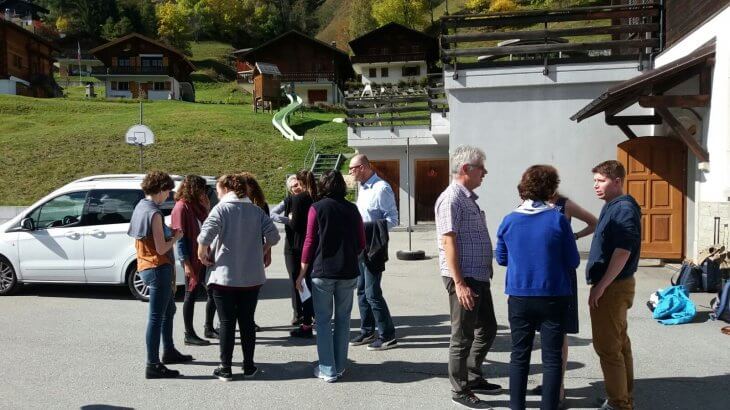
7 Feb 2018 | Focolare Worldwide
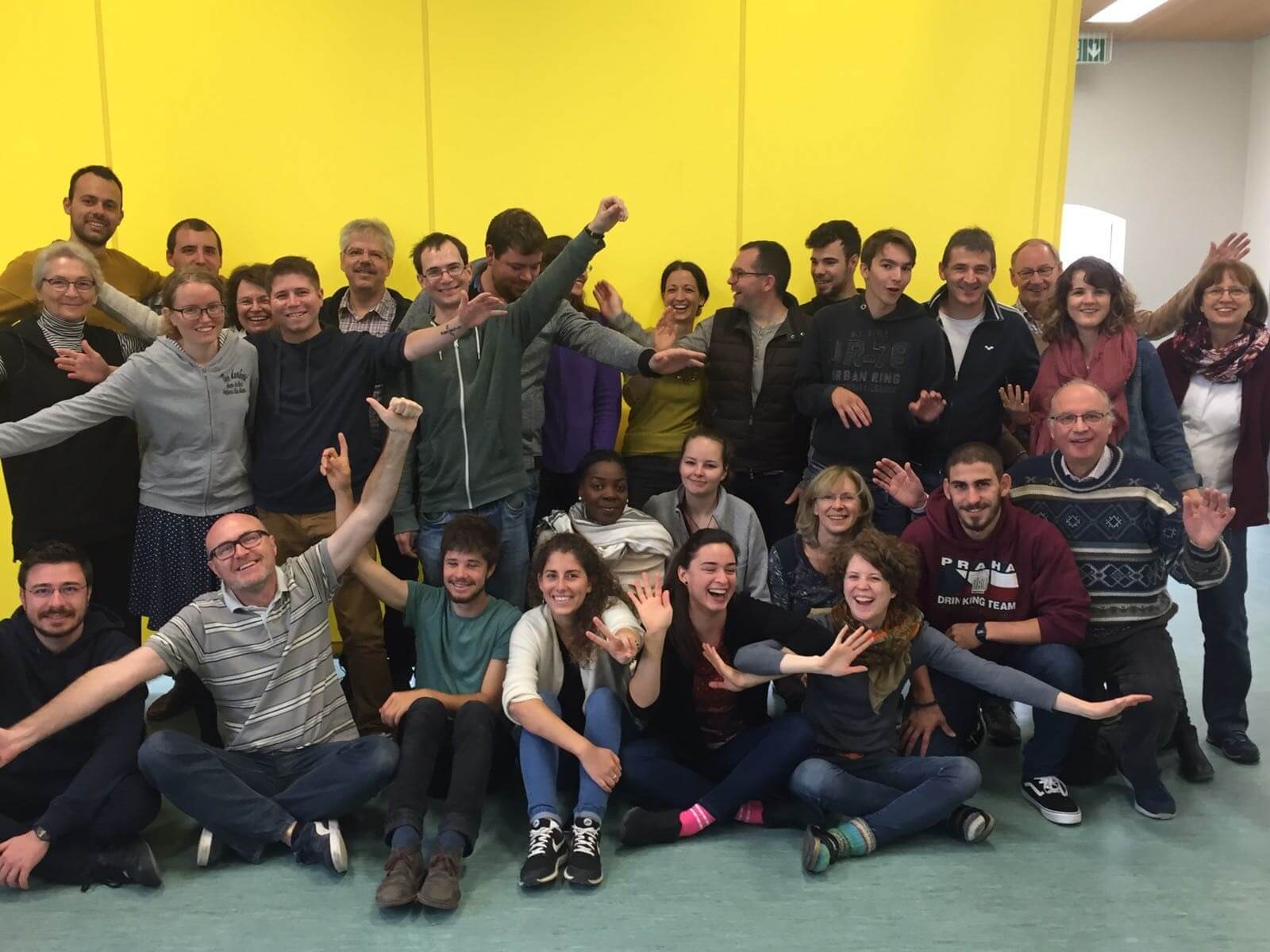 What drives a group of young people aged 18 to 34 years, from the three linguistic regions of Switzerland, to spend some days in the mountains together with eight focolare men and women, a couple of married focolarini and a priest? “The scope of “Behind the Scenes of the Focolare”, a weekend held in the splendid background of the Valais Alps, was not only to enjoy nature, but also to ask oneself, immersed in an ideal environment, a series of essential questions on the life one has lived so far and the years lying ahead. And among such queries was: What path shall I take? This question is often not easy to answer, especially when there are extraordinary and often unrepeatable possibilities from which one can choose. To consciously undertake one – the organizers thought – that it would be helpful to turn down the volume of daily vicissitudes and find a place where it is easier to listen to a suggestion, often whispered to one’s heart. “This is how we got the idea of spending a weekend together, where one can express oneself freely and sincerely, and where Jesus can speak out in the intimacy of one’s heart. A mix of deep reflection and community life, consisting of walks, games, clearing, coking, prayer, to express at best the beauty and also the “normality” of following His call, also today.”
What drives a group of young people aged 18 to 34 years, from the three linguistic regions of Switzerland, to spend some days in the mountains together with eight focolare men and women, a couple of married focolarini and a priest? “The scope of “Behind the Scenes of the Focolare”, a weekend held in the splendid background of the Valais Alps, was not only to enjoy nature, but also to ask oneself, immersed in an ideal environment, a series of essential questions on the life one has lived so far and the years lying ahead. And among such queries was: What path shall I take? This question is often not easy to answer, especially when there are extraordinary and often unrepeatable possibilities from which one can choose. To consciously undertake one – the organizers thought – that it would be helpful to turn down the volume of daily vicissitudes and find a place where it is easier to listen to a suggestion, often whispered to one’s heart. “This is how we got the idea of spending a weekend together, where one can express oneself freely and sincerely, and where Jesus can speak out in the intimacy of one’s heart. A mix of deep reflection and community life, consisting of walks, games, clearing, coking, prayer, to express at best the beauty and also the “normality” of following His call, also today.” 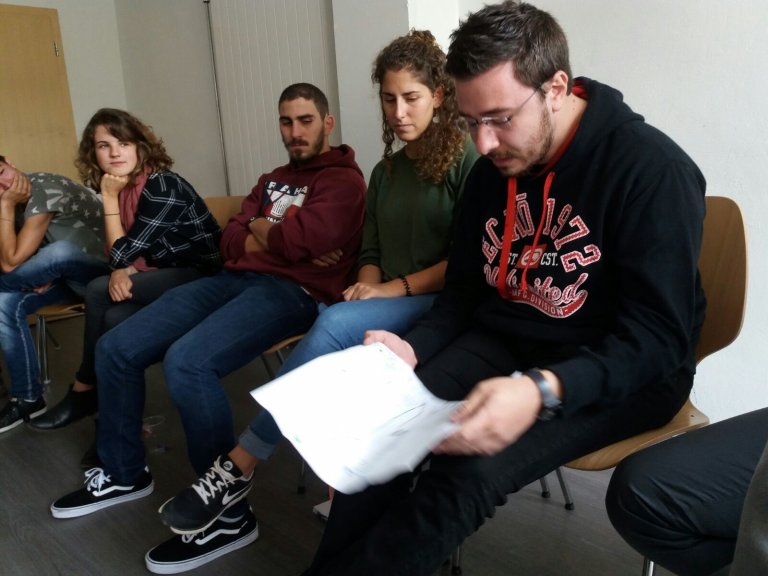 “Behind the scenes” of focolare life lies a personal call of God to achieve a community of laity, virgins and married people (each according to their status), fully immersed in the world, but imbued with the spiritual presence of Jesus among them, fruit of mutual love. It is a “presence” that wishes to bring to the world, with the objective and perspective of unity among people and societies, a more fraternal and united world that respects diversity. Some of the youths present had never investigated this possibility. Others had already decided to form a family, while others still had not posed the issue. But all had the desire to deepen a personal rapport with God and know more about this particular way of coexistence based on the model of the family of Nazareth, born from the charism of Chiara Lubich. “You live in the midst of society, and you don’t have a convent that protects you, how do you manage?” “Great, but isn’t it too difficult?” “What does it mean to follow Jesus today?” Many questions came up spontaneously and many answers were given, starting from personal experiences and the group meditations on the articles on the evangelical spirituality of unity.
“Behind the scenes” of focolare life lies a personal call of God to achieve a community of laity, virgins and married people (each according to their status), fully immersed in the world, but imbued with the spiritual presence of Jesus among them, fruit of mutual love. It is a “presence” that wishes to bring to the world, with the objective and perspective of unity among people and societies, a more fraternal and united world that respects diversity. Some of the youths present had never investigated this possibility. Others had already decided to form a family, while others still had not posed the issue. But all had the desire to deepen a personal rapport with God and know more about this particular way of coexistence based on the model of the family of Nazareth, born from the charism of Chiara Lubich. “You live in the midst of society, and you don’t have a convent that protects you, how do you manage?” “Great, but isn’t it too difficult?” “What does it mean to follow Jesus today?” Many questions came up spontaneously and many answers were given, starting from personal experiences and the group meditations on the articles on the evangelical spirituality of unity.  Kati and Istvan, a married couple, shared their own joys, difficulties and fundamental choices of their family. “I was deeply struck by the depth of the themes discussed even if I did not know you,” said one of the boys. “I came with a lot of questions and found many answers,” a girl said upon returning home. Peter, a priest remarked; “This was an unexpected weekend. Some of the boys expressed the desire to continue such sessions. This, to my mind, was the most important message of the two days spent together; we live for you and with you, in the uncertainty of the choice to make in life, but in the certainty of no longer being alone in this quest.”
Kati and Istvan, a married couple, shared their own joys, difficulties and fundamental choices of their family. “I was deeply struck by the depth of the themes discussed even if I did not know you,” said one of the boys. “I came with a lot of questions and found many answers,” a girl said upon returning home. Peter, a priest remarked; “This was an unexpected weekend. Some of the boys expressed the desire to continue such sessions. This, to my mind, was the most important message of the two days spent together; we live for you and with you, in the uncertainty of the choice to make in life, but in the certainty of no longer being alone in this quest.”

2 Feb 2018 | Focolare Worldwide
 The Focolare Movement has received the surprising news of Pope Francis’s visit to Loppiano, a little town of the Movement, scheduled for 10th May 2018. Focolare President, Maria Voce, will receive the Pope, together with the local Ordinary, Rt Rev. Mario Meini, Bishop of Fiesole. Maria Voce’s immediate response was, “This surprising news has given me deep joy. It is a great honour for the Focolare Movement to welcome a Pope into our midst, in one of our little towns. Above all, it prompts us to intensify our commitment to live love and unity, being rooted in the Gospel. All we want is that the Pope should find this breath of Gospel life on his arrival at Loppiano. Now that the news is spreading to the Movement’s communities, this joy and commitment will be shared all over the world”. Loppiano is the first of the Focolare’s little towns, established in 1964 on the Tuscan hills not far from Florence. Currently, there are 850 residents: men and women, families, young people and children, priests and religious from 65 countries and all 5 continents. More than half live there permanently while others are attending one of the 12 international schools during which they spend 6-18 months at Loppiano. This multi-national and multi-cultural population has made its own the law of mutual love. This makes Loppiano become a workshop of shared living among people of different ages, backgrounds, traditions, cultures and religious faiths.
The Focolare Movement has received the surprising news of Pope Francis’s visit to Loppiano, a little town of the Movement, scheduled for 10th May 2018. Focolare President, Maria Voce, will receive the Pope, together with the local Ordinary, Rt Rev. Mario Meini, Bishop of Fiesole. Maria Voce’s immediate response was, “This surprising news has given me deep joy. It is a great honour for the Focolare Movement to welcome a Pope into our midst, in one of our little towns. Above all, it prompts us to intensify our commitment to live love and unity, being rooted in the Gospel. All we want is that the Pope should find this breath of Gospel life on his arrival at Loppiano. Now that the news is spreading to the Movement’s communities, this joy and commitment will be shared all over the world”. Loppiano is the first of the Focolare’s little towns, established in 1964 on the Tuscan hills not far from Florence. Currently, there are 850 residents: men and women, families, young people and children, priests and religious from 65 countries and all 5 continents. More than half live there permanently while others are attending one of the 12 international schools during which they spend 6-18 months at Loppiano. This multi-national and multi-cultural population has made its own the law of mutual love. This makes Loppiano become a workshop of shared living among people of different ages, backgrounds, traditions, cultures and religious faiths.
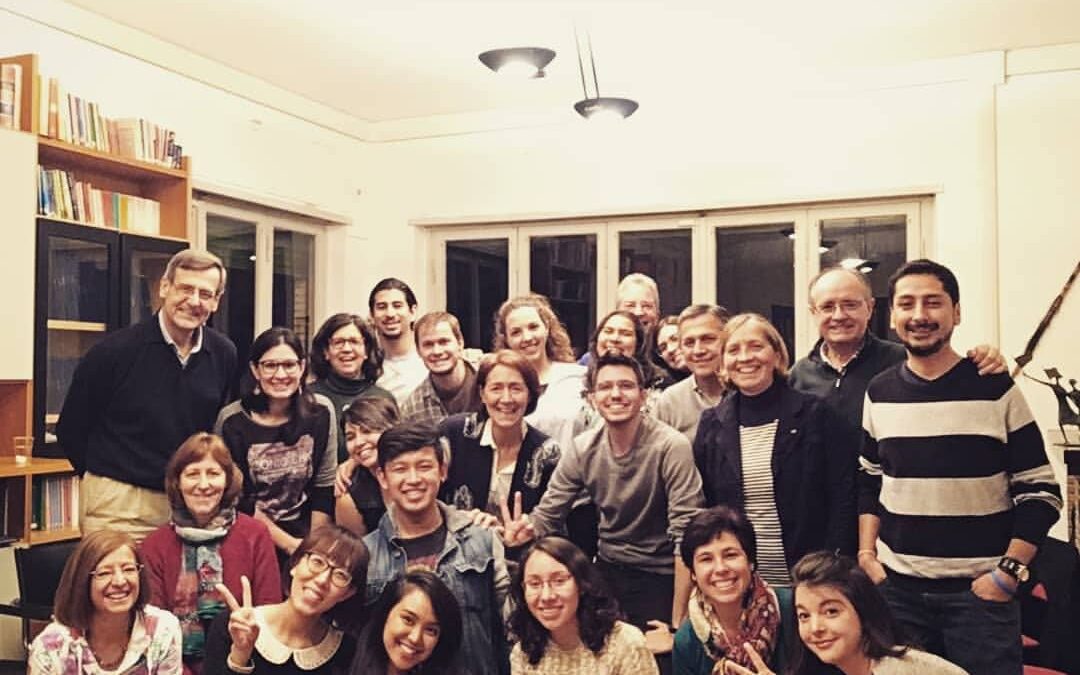
2 Feb 2018 | Focolare Worldwide
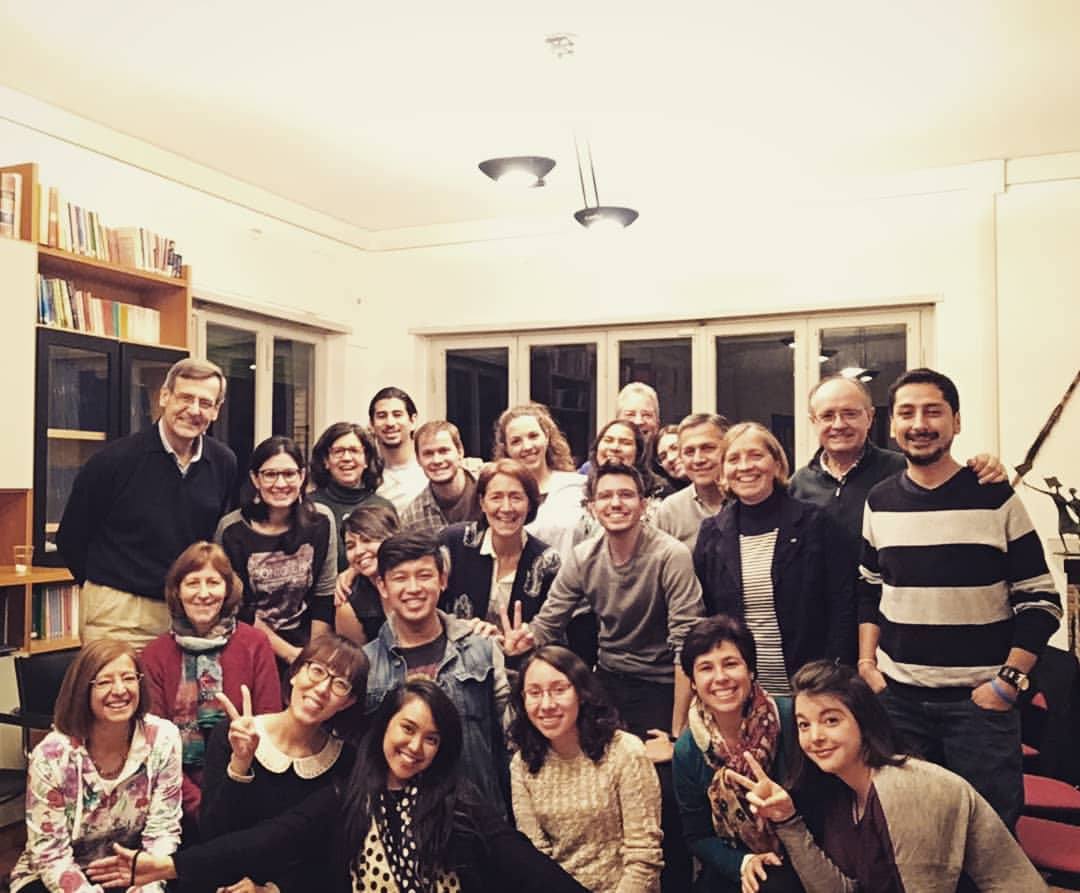 “I’m working in Italy working with some other young people my age for the upcoming 2018 Genfest in Manila.” Preparations are in full swing for the first Genfest ever held outside Europe. Nelson joined the international group of teenagers who were already at work, ever since he arrived in Italy in 2017 – first in Loppiano and then at the international Gen2 centre near Rome where we are interviewing him. “I come from El Salvador, the least expansive but most populated country in Central America. It’s a beautiful place, but has recently been hit by a civil war that lasted for 12 years and ended in 1992, leaving the country completely destroyed.” Nelson explains; “After the end of the war, many families found themselves looking for a place to settle and many parents emigrated, leaving their children with relatives or anyone who would take them in. But in the midst of the overall bewilderment, this resulted in an entire generation of boys and teenagers who were left without guidance or direction, or even anyone to show some genuine interest in them. To that was added the complication of getting the money earned outside the country to its destination in El Salvador. Many of these boys were left deprived of everything and began to leave school and roam the streets, seeking in delinquency the attention that they hadn’t found anwhere else. In short, recruiting adolescents, some of them quite young, they formed into many criminall groups who became more and more rooted and dangerous, each with its own name and symbolism, rituals and gestures.” “To uproot what seemed at first a simple problem to solve, the government launched a plan, which was also very violent, inprisoning anyone with a tatoo. The result was an unprecedented escalation of ferocious violence from the gangs that began to kill for no reason, to threaten more and more young people, forcing them into their groups. Before moving to Italy, I worked in San Miguel at a Salesian school which was dedicated to more than a thousand students who come from outside the city every week. Many of them have serious family problems, or parents enlisted in criminal groups, or even worse, they themselves are on the verge of joining. I taught physical education. One day, during swimming class, a boy wanted to jump into the pool without removing his shirt, even though that was against the rules. He was nervous and afraid. So I took him aside so that I could talk to him alone. I asked him the reason why. He told me that he had had himself tattooed with the symbol of a group, and didn’t want anyone to know. I gave him permissioin to get into the water with the shirt on, but afterwards, in class, I returned to the topic and we began to talk about ways of finding alternatives to criminality. Then, for the rest of the year, we tried to explain to him all of us together, that there’s always a way out, another way to live, far from violence. A few months later I saw him proudly wearing a work uniform, he had managed to leave the group which, thanks be to God had left him in peace. Now he’s providing for his family. ‘Thanks Prof. Thanks to all of you who helped me to realize that I could be a different person from what I started out to be. Thank you mostly for helping me to change the direction of my life.’” Chiara Favotti
“I’m working in Italy working with some other young people my age for the upcoming 2018 Genfest in Manila.” Preparations are in full swing for the first Genfest ever held outside Europe. Nelson joined the international group of teenagers who were already at work, ever since he arrived in Italy in 2017 – first in Loppiano and then at the international Gen2 centre near Rome where we are interviewing him. “I come from El Salvador, the least expansive but most populated country in Central America. It’s a beautiful place, but has recently been hit by a civil war that lasted for 12 years and ended in 1992, leaving the country completely destroyed.” Nelson explains; “After the end of the war, many families found themselves looking for a place to settle and many parents emigrated, leaving their children with relatives or anyone who would take them in. But in the midst of the overall bewilderment, this resulted in an entire generation of boys and teenagers who were left without guidance or direction, or even anyone to show some genuine interest in them. To that was added the complication of getting the money earned outside the country to its destination in El Salvador. Many of these boys were left deprived of everything and began to leave school and roam the streets, seeking in delinquency the attention that they hadn’t found anwhere else. In short, recruiting adolescents, some of them quite young, they formed into many criminall groups who became more and more rooted and dangerous, each with its own name and symbolism, rituals and gestures.” “To uproot what seemed at first a simple problem to solve, the government launched a plan, which was also very violent, inprisoning anyone with a tatoo. The result was an unprecedented escalation of ferocious violence from the gangs that began to kill for no reason, to threaten more and more young people, forcing them into their groups. Before moving to Italy, I worked in San Miguel at a Salesian school which was dedicated to more than a thousand students who come from outside the city every week. Many of them have serious family problems, or parents enlisted in criminal groups, or even worse, they themselves are on the verge of joining. I taught physical education. One day, during swimming class, a boy wanted to jump into the pool without removing his shirt, even though that was against the rules. He was nervous and afraid. So I took him aside so that I could talk to him alone. I asked him the reason why. He told me that he had had himself tattooed with the symbol of a group, and didn’t want anyone to know. I gave him permissioin to get into the water with the shirt on, but afterwards, in class, I returned to the topic and we began to talk about ways of finding alternatives to criminality. Then, for the rest of the year, we tried to explain to him all of us together, that there’s always a way out, another way to live, far from violence. A few months later I saw him proudly wearing a work uniform, he had managed to leave the group which, thanks be to God had left him in peace. Now he’s providing for his family. ‘Thanks Prof. Thanks to all of you who helped me to realize that I could be a different person from what I started out to be. Thank you mostly for helping me to change the direction of my life.’” Chiara Favotti
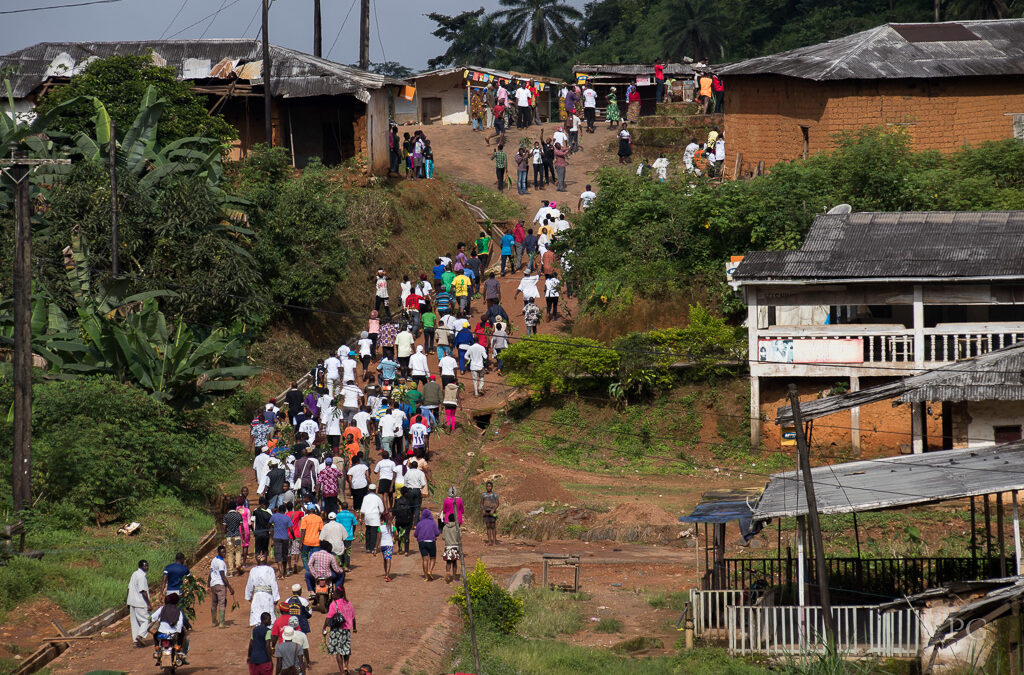
31 Jan 2018 | Focolare Worldwide
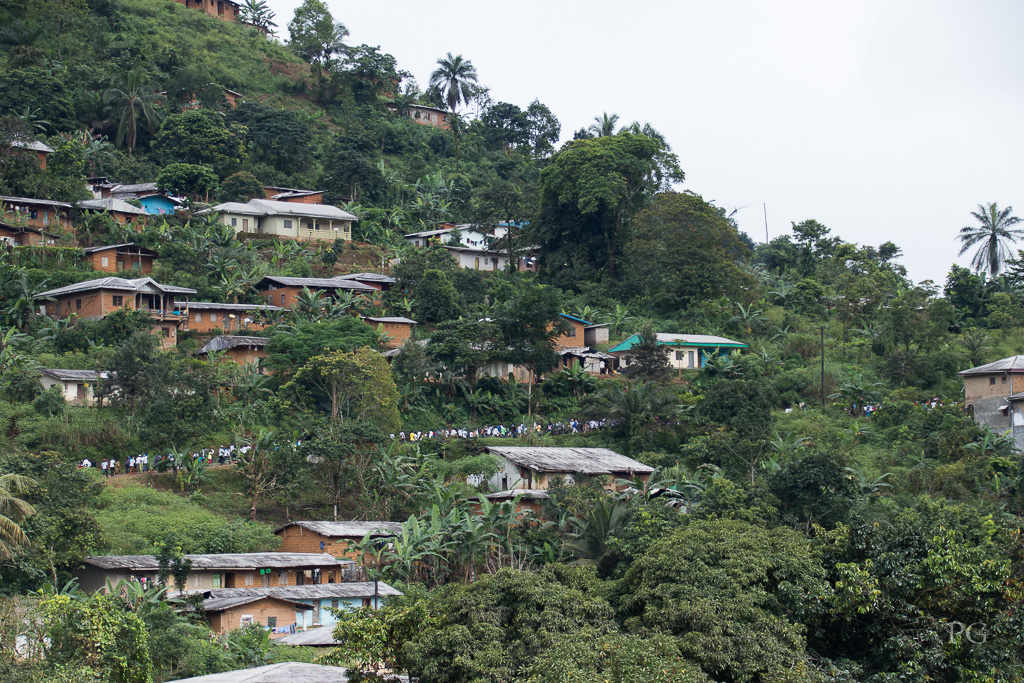 Cameroon, in the equatorial region of West Africa, is composed of two groups of regions that speak French and English respectively. The differences between them are not limited to language, but also some aspects of public administration. An escalation of violence is threatening the country of 23 million people livining within a territory of 475 thousand square kilometers. Raphaël Takougang, a Cameroonian lawyer and member of the Focolare, who now lives in Italy, explains: “The francophone part became independent on January 1, 1960. For the English-speaking part there was a referendum on October 1, 1961 to decide whether or not to join neighbouring Nigeria, which was already Anglophone, or stay with Cameroon. The northern part of this region chose to join Nigeria, the south preferred to stay with Cameroon. Thus was born a Federal Republic with two states, East Cameroon and South Cameroon, each with its own institutions – Parliament, government, legal systems – and others at the federal level. On May 20, 1972, another referendum resulted in the United Republic of Cameroon. In 1984, a small change in the Constitution removed the word “united” and, from then on, the country has been called the Republic of Cameroon. Ever since 1972 the malaise has been growing among the Anglophones who are a strong minority in the country, and there is even a name for it: the Anglophone problem.
Cameroon, in the equatorial region of West Africa, is composed of two groups of regions that speak French and English respectively. The differences between them are not limited to language, but also some aspects of public administration. An escalation of violence is threatening the country of 23 million people livining within a territory of 475 thousand square kilometers. Raphaël Takougang, a Cameroonian lawyer and member of the Focolare, who now lives in Italy, explains: “The francophone part became independent on January 1, 1960. For the English-speaking part there was a referendum on October 1, 1961 to decide whether or not to join neighbouring Nigeria, which was already Anglophone, or stay with Cameroon. The northern part of this region chose to join Nigeria, the south preferred to stay with Cameroon. Thus was born a Federal Republic with two states, East Cameroon and South Cameroon, each with its own institutions – Parliament, government, legal systems – and others at the federal level. On May 20, 1972, another referendum resulted in the United Republic of Cameroon. In 1984, a small change in the Constitution removed the word “united” and, from then on, the country has been called the Republic of Cameroon. Ever since 1972 the malaise has been growing among the Anglophones who are a strong minority in the country, and there is even a name for it: the Anglophone problem. 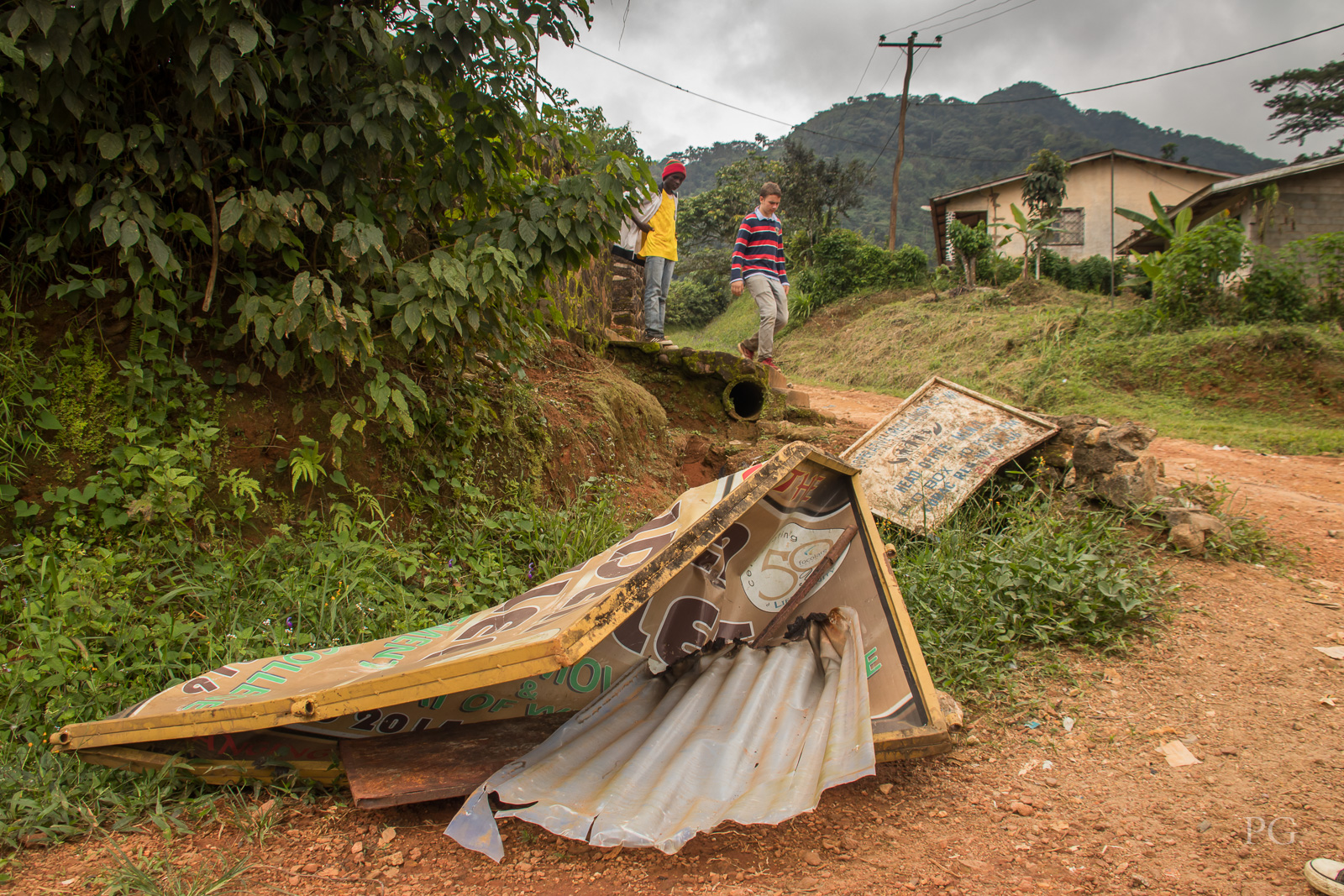 Ever since 2016 the crisis situation in the Anglophone region set off a series of strikes, first against teachers, then against lawyers. The people of the Mariapolis in Fontem, in the very heart of the Cameroon forest, explain: “While on the one hand the bishops had always encouraged dialogue, the boycotting of educational and justice institutions had an unexpected result on the crisis, which worsened with an escalation of strikes also among commercial businesses and transportation systems, in accordance with a strategy known as “Dead City.” No students showed up for the beginning of the last year school year. Despite the threats of reprisals against transgressors, here and there, some schools courageously opened their doors and others followed their example. The OLSW College in Fontem also resumed classes.” The Mariapolis in Fontem was born from the testimony of concrete love of some doctors, who arrived there in 1966, after the local bishop appealed to Chiara Lubich to take care of the Bangwa people, who were suffering from a very high infant mortality rate that was leading to their extinction. In a short time, thanks to the contribution of people from all over the world, Fontem equipped itself with schools, a hospital and other service facilities. Since then, the Bangwa people and several other neighbouring peoples have set out on the path of fraternity, which can be seen now in other citadels that have begun on the African continent. With its 80 thousand citizens, Fontem is a meeting and training place for people from all over Africa and the world. Here they experience how the exchange and collaboration among men and women of different races, cultures and traditions can bear fruits of brotherhood even in regions battered by conflicts.
Ever since 2016 the crisis situation in the Anglophone region set off a series of strikes, first against teachers, then against lawyers. The people of the Mariapolis in Fontem, in the very heart of the Cameroon forest, explain: “While on the one hand the bishops had always encouraged dialogue, the boycotting of educational and justice institutions had an unexpected result on the crisis, which worsened with an escalation of strikes also among commercial businesses and transportation systems, in accordance with a strategy known as “Dead City.” No students showed up for the beginning of the last year school year. Despite the threats of reprisals against transgressors, here and there, some schools courageously opened their doors and others followed their example. The OLSW College in Fontem also resumed classes.” The Mariapolis in Fontem was born from the testimony of concrete love of some doctors, who arrived there in 1966, after the local bishop appealed to Chiara Lubich to take care of the Bangwa people, who were suffering from a very high infant mortality rate that was leading to their extinction. In a short time, thanks to the contribution of people from all over the world, Fontem equipped itself with schools, a hospital and other service facilities. Since then, the Bangwa people and several other neighbouring peoples have set out on the path of fraternity, which can be seen now in other citadels that have begun on the African continent. With its 80 thousand citizens, Fontem is a meeting and training place for people from all over Africa and the world. Here they experience how the exchange and collaboration among men and women of different races, cultures and traditions can bear fruits of brotherhood even in regions battered by conflicts. 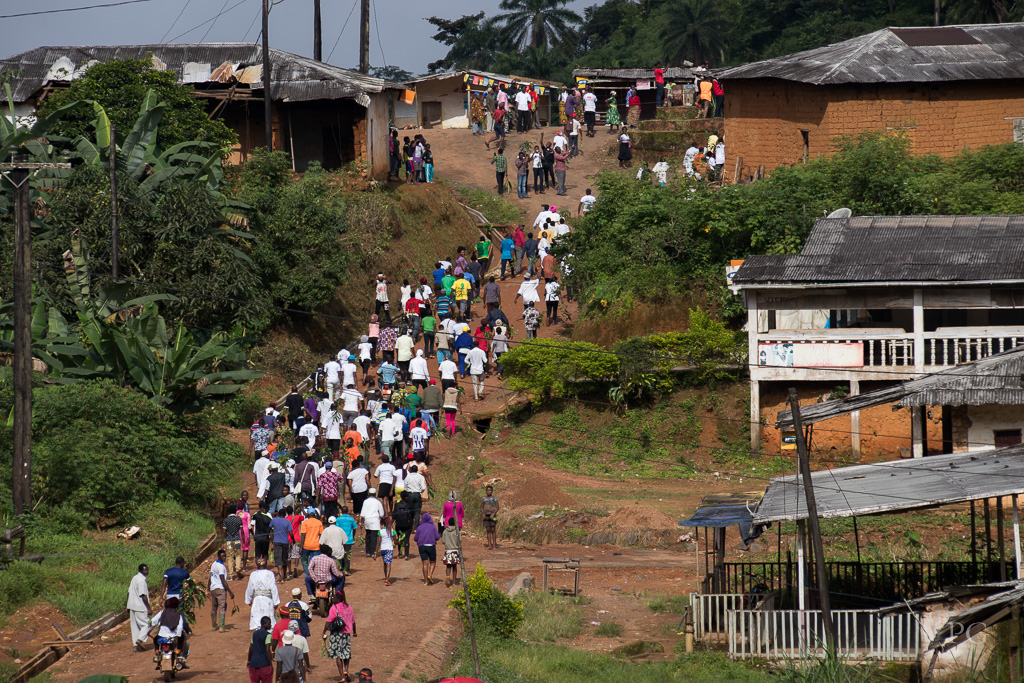 “The Catholic college in Fontem suffered an attack,” the locals have reported, “but many people of the village have come to help students and teachers, even at the risk of their own lives. With the approach of the anniversary of the aforementioned referendum, of October 1, which is such an historical date for the Anglophone region of Cameroon, violent demonstrations were feared, and the Focolare community organized prayer groups that included people from other regions of the country and from abroad. There has been no loss of life in Fontem. Every occasion is good for building relationships with the various civil, traditional and ecclesial authorities. We try to help those near to us to go beyond the fears, to create family moments, starting from those closest to us, who are often confused by the many voices and the media. The young people have organized “talent show” evenings and the “Sports for Peace” event to promote a more positive spirit “. “All during this period, even in the midst of difficulties – they conclude – the life of the Focolare community has continued. We hope that this challenge of love for all will enable us to discern and to act for the good of our country “.
“The Catholic college in Fontem suffered an attack,” the locals have reported, “but many people of the village have come to help students and teachers, even at the risk of their own lives. With the approach of the anniversary of the aforementioned referendum, of October 1, which is such an historical date for the Anglophone region of Cameroon, violent demonstrations were feared, and the Focolare community organized prayer groups that included people from other regions of the country and from abroad. There has been no loss of life in Fontem. Every occasion is good for building relationships with the various civil, traditional and ecclesial authorities. We try to help those near to us to go beyond the fears, to create family moments, starting from those closest to us, who are often confused by the many voices and the media. The young people have organized “talent show” evenings and the “Sports for Peace” event to promote a more positive spirit “. “All during this period, even in the midst of difficulties – they conclude – the life of the Focolare community has continued. We hope that this challenge of love for all will enable us to discern and to act for the good of our country “.
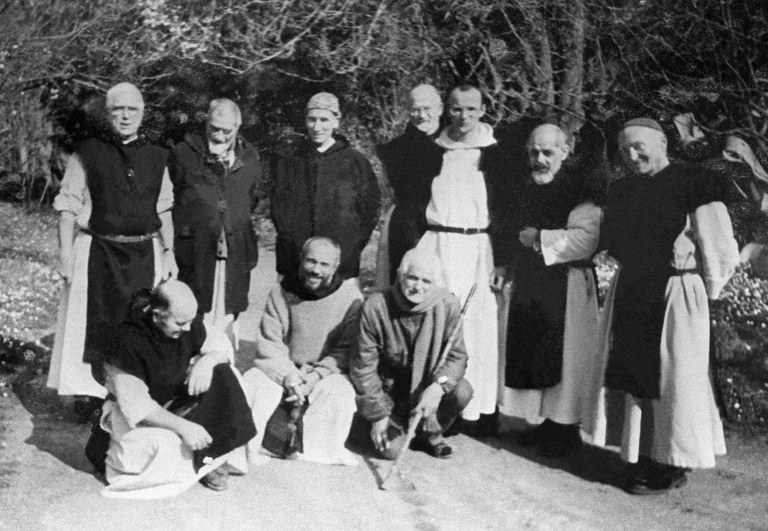
31 Jan 2018 | Focolare Worldwide
 The Vatican has promulgated the decree attesting to the martyrdom of the 7 monks of Tibhirine, among whom Msgr Pierre Claverie, Bishop of Orano, and the other 11 male and female consecrated religious, killed between 1994 and 1996 during the Algerian civil war which caused the death of thousands of innocent people among which journalists, writers, Imams and common folk. A movie entitled “Of Gods and Men” was made about the 7 Trappist monks who were abducted from their abbey of Our Lady of Atlante (80 km from Algiers) and slain in still obscure circumstances. These vicissitudes reached their peak in August 1996, when the Dominican Bishop of Orano, fervid defender of the reconciliation between Muslims and Christians, was killed together with his Muslim driver, by a bomb at the entrance of his house. The spokesman of the French Bishops’ Conference said “They are martyrs of love because they loved up to the end, giving their lives for their Algerian friends. For us it is a sign that love is not vain and will triumph.” The Algerian bishops commented “Our Church is rejoicing” associating to their homage “the thousands of people who were not afraid to risk their own lives for their fidelity in the faith in God, their country and their conscience.”
The Vatican has promulgated the decree attesting to the martyrdom of the 7 monks of Tibhirine, among whom Msgr Pierre Claverie, Bishop of Orano, and the other 11 male and female consecrated religious, killed between 1994 and 1996 during the Algerian civil war which caused the death of thousands of innocent people among which journalists, writers, Imams and common folk. A movie entitled “Of Gods and Men” was made about the 7 Trappist monks who were abducted from their abbey of Our Lady of Atlante (80 km from Algiers) and slain in still obscure circumstances. These vicissitudes reached their peak in August 1996, when the Dominican Bishop of Orano, fervid defender of the reconciliation between Muslims and Christians, was killed together with his Muslim driver, by a bomb at the entrance of his house. The spokesman of the French Bishops’ Conference said “They are martyrs of love because they loved up to the end, giving their lives for their Algerian friends. For us it is a sign that love is not vain and will triumph.” The Algerian bishops commented “Our Church is rejoicing” associating to their homage “the thousands of people who were not afraid to risk their own lives for their fidelity in the faith in God, their country and their conscience.”
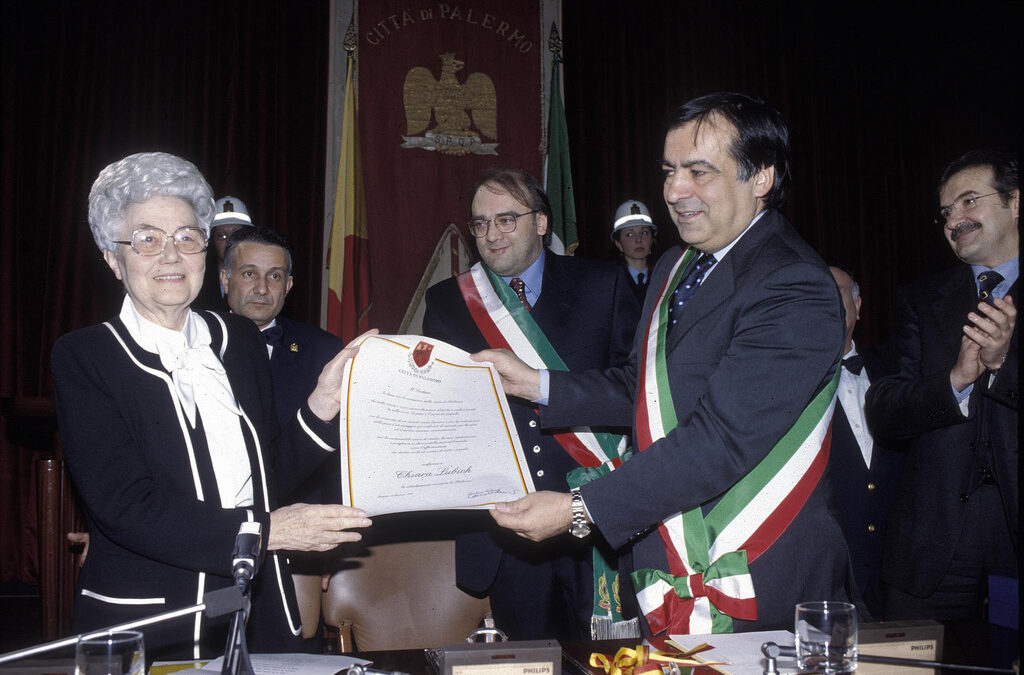
29 Jan 2018 | Focolare Worldwide
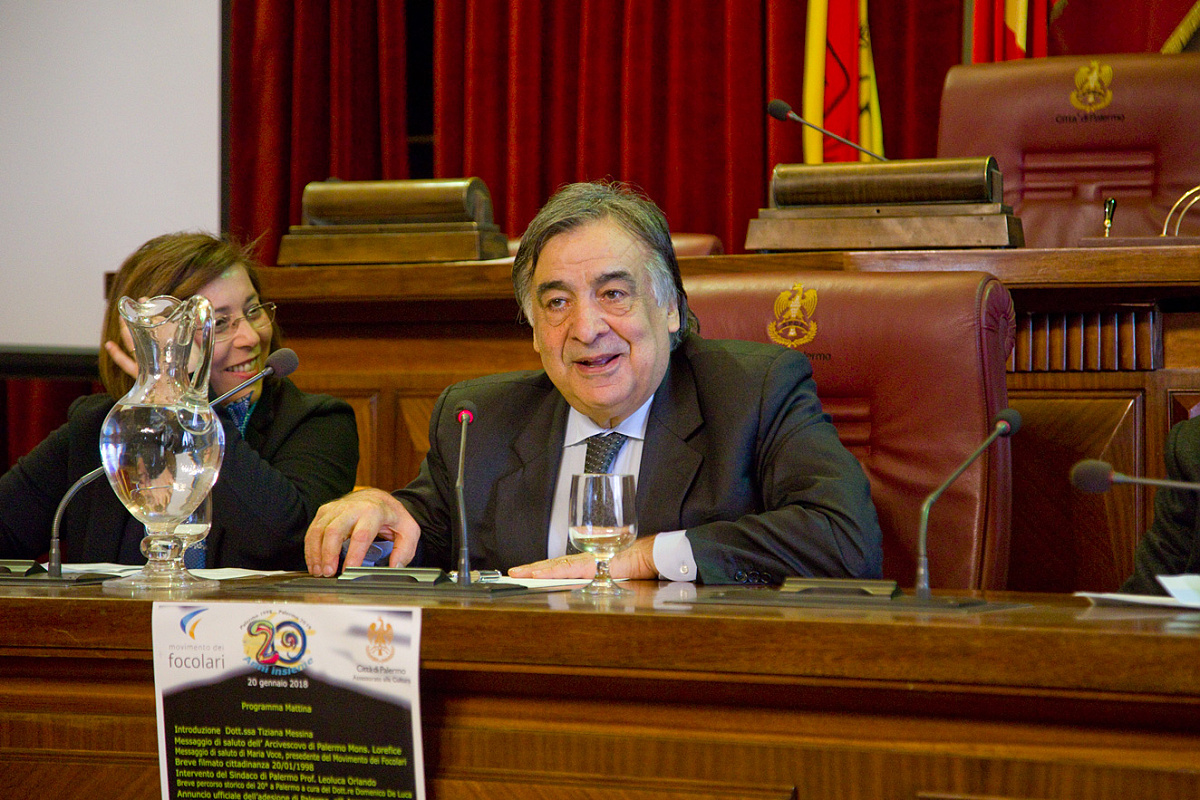 January 1998. Palermo prepared for the Grand Jubilee of the year 2000 attracting to itself the signs of light and shadow. It was a mute city, bloodied by the past and recent massacres of the mafia, but also a city determined to redeem itself and show its true countenance. January 2018. Today, the Sicilian capital appears as a “mosaic city,” an advanced expression of the dialogue between the various European cultures and the Arab world, and an outpost of Middle East culture within the European fabric. In the presence of Mayor Leoluca Orlando and the authorities of some representatives of the institutions, on 20 January the city wanted to “commemorate” – as a “commitment” to proceed in the same direction – an event which was for the city a step in its “magnificent providential design,” according to the words Chiara Lubich expressed then. During the various speeches, some aspects of the life of the Focolare over the last 20 years emerged: the social commitment and in the field of schooling, especially in some outskirt districts like Ballarò, Brancaccio and Zen, the promotion of events and the reflection on some grand themes like ecumenism, commitment toward the new generations with the start-up of schools of civil participation, and the discussion with personalities from the economic, political, cultural and art sectors. In these years the Focolare community has contributed to the journey of the entire city towards the construction of a “city of reception and rights,” with the values of fraternity and the continual pursuit of dialogue.
January 1998. Palermo prepared for the Grand Jubilee of the year 2000 attracting to itself the signs of light and shadow. It was a mute city, bloodied by the past and recent massacres of the mafia, but also a city determined to redeem itself and show its true countenance. January 2018. Today, the Sicilian capital appears as a “mosaic city,” an advanced expression of the dialogue between the various European cultures and the Arab world, and an outpost of Middle East culture within the European fabric. In the presence of Mayor Leoluca Orlando and the authorities of some representatives of the institutions, on 20 January the city wanted to “commemorate” – as a “commitment” to proceed in the same direction – an event which was for the city a step in its “magnificent providential design,” according to the words Chiara Lubich expressed then. During the various speeches, some aspects of the life of the Focolare over the last 20 years emerged: the social commitment and in the field of schooling, especially in some outskirt districts like Ballarò, Brancaccio and Zen, the promotion of events and the reflection on some grand themes like ecumenism, commitment toward the new generations with the start-up of schools of civil participation, and the discussion with personalities from the economic, political, cultural and art sectors. In these years the Focolare community has contributed to the journey of the entire city towards the construction of a “city of reception and rights,” with the values of fraternity and the continual pursuit of dialogue. 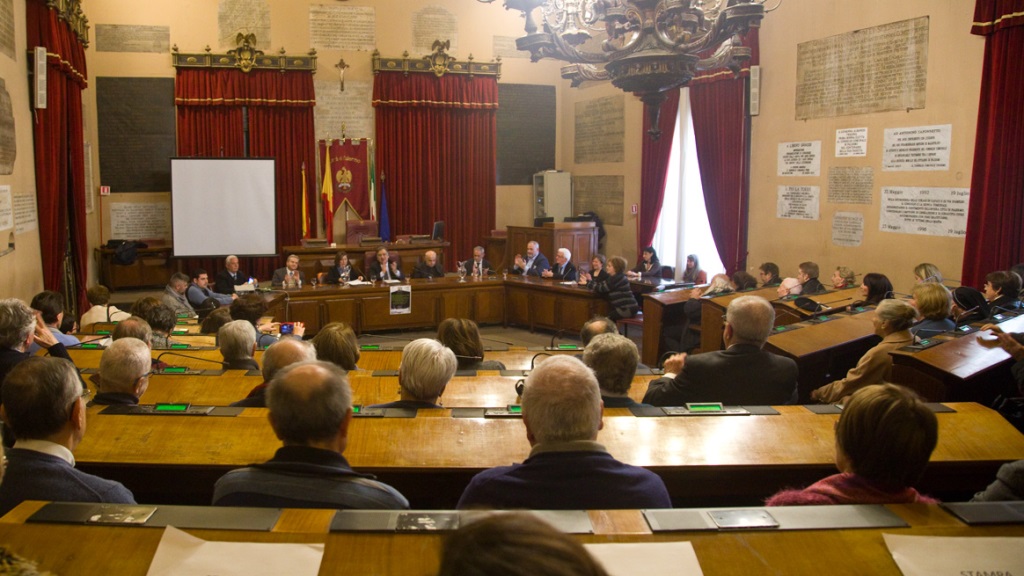 “The memory of the honorary citizenship given to Chiara Lubich,” affirmed Mayor Orlando, “is an occasion to see the city’s progress, in the name of respect for the human being and the construction of a community founded on the values of unity and brotherhood: those on which Chiara had founded her movement and which today brings together millions of people worldwide. Today those values are part of the daily life of Palermo, with reception and solidarity which are the testing grounds, but also an extraordinary occasion to confirm the will of the Palermo people to build a city on a human scale and that welcomes others, as is continually demonstrated in civil society’s undertakings.”
“The memory of the honorary citizenship given to Chiara Lubich,” affirmed Mayor Orlando, “is an occasion to see the city’s progress, in the name of respect for the human being and the construction of a community founded on the values of unity and brotherhood: those on which Chiara had founded her movement and which today brings together millions of people worldwide. Today those values are part of the daily life of Palermo, with reception and solidarity which are the testing grounds, but also an extraordinary occasion to confirm the will of the Palermo people to build a city on a human scale and that welcomes others, as is continually demonstrated in civil society’s undertakings.” 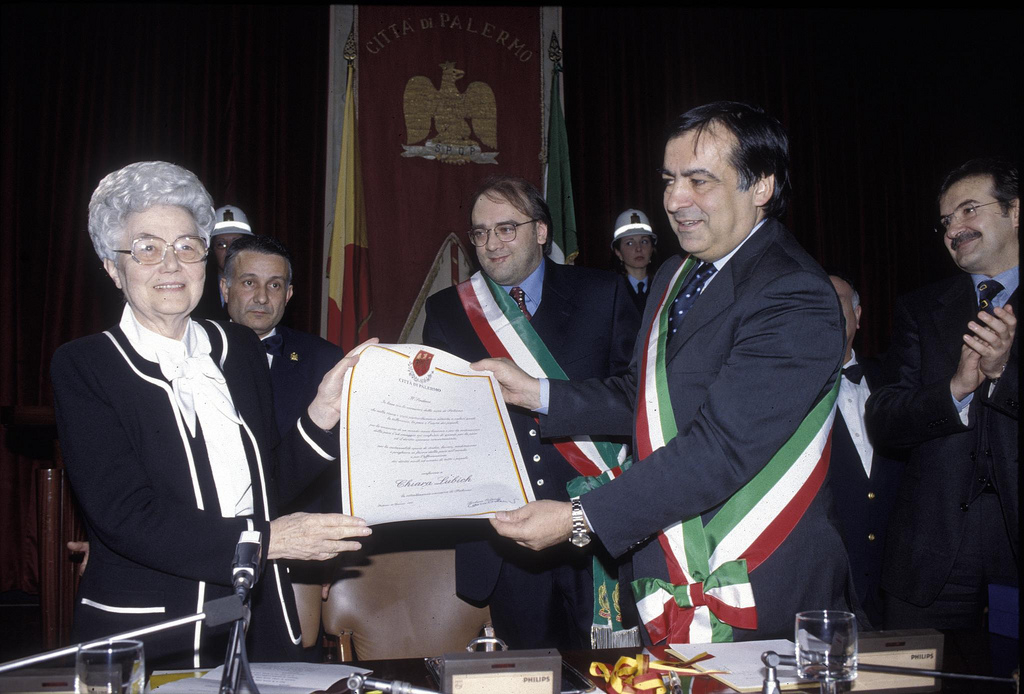 The Archbishop of Palermo, Bishop Corrado Lorefice, encouraged all to continue along this path of fraternity through dialogue at all levels, towards a goal “indicated prophetically by Chiara Lubich: that Palermo may become a city on the hill, to which one can refer for the achievement of God’s design for the community of people.” He added, “the celebration of such an event expresses the deep harmony between the city of Palermo and the values contained in Chiara’s charism: work for the reconstruction of unity of the human family.” Maria Voce, President of the Focolare, encouraged all in a message to “share the many moments of fraternity that have been consolidated all these years to promote acceptance, lawfulness and peace,” with the hope “that the city may increasingly stand out for its active testimony on the various fronts of dialogue, multiplying initiatives and imbuing hope and valorising the talents of all in the perspective of unity.” The adhesion to the “City for fraternity” Association, created by the Municipality of Palermo, further commits its citizens to draw inspiration from universal fraternity in every future decision and action.
The Archbishop of Palermo, Bishop Corrado Lorefice, encouraged all to continue along this path of fraternity through dialogue at all levels, towards a goal “indicated prophetically by Chiara Lubich: that Palermo may become a city on the hill, to which one can refer for the achievement of God’s design for the community of people.” He added, “the celebration of such an event expresses the deep harmony between the city of Palermo and the values contained in Chiara’s charism: work for the reconstruction of unity of the human family.” Maria Voce, President of the Focolare, encouraged all in a message to “share the many moments of fraternity that have been consolidated all these years to promote acceptance, lawfulness and peace,” with the hope “that the city may increasingly stand out for its active testimony on the various fronts of dialogue, multiplying initiatives and imbuing hope and valorising the talents of all in the perspective of unity.” The adhesion to the “City for fraternity” Association, created by the Municipality of Palermo, further commits its citizens to draw inspiration from universal fraternity in every future decision and action.

 What drives a group of young people aged 18 to 34 years, from the three linguistic regions of Switzerland, to spend some days in the mountains together with eight focolare men and women, a couple of married focolarini and a priest? “The scope of “Behind the Scenes of the Focolare”, a weekend held in the splendid background of the Valais Alps, was not only to enjoy nature, but also to ask oneself, immersed in an ideal environment, a series of essential questions on the life one has lived so far and the years lying ahead. And among such queries was: What path shall I take? This question is often not easy to answer, especially when there are extraordinary and often unrepeatable possibilities from which one can choose. To consciously undertake one – the organizers thought – that it would be helpful to turn down the volume of daily vicissitudes and find a place where it is easier to listen to a suggestion, often whispered to one’s heart. “This is how we got the idea of spending a weekend together, where one can express oneself freely and sincerely, and where Jesus can speak out in the intimacy of one’s heart. A mix of deep reflection and community life, consisting of walks, games, clearing, coking, prayer, to express at best the beauty and also the “normality” of following His call, also today.”
What drives a group of young people aged 18 to 34 years, from the three linguistic regions of Switzerland, to spend some days in the mountains together with eight focolare men and women, a couple of married focolarini and a priest? “The scope of “Behind the Scenes of the Focolare”, a weekend held in the splendid background of the Valais Alps, was not only to enjoy nature, but also to ask oneself, immersed in an ideal environment, a series of essential questions on the life one has lived so far and the years lying ahead. And among such queries was: What path shall I take? This question is often not easy to answer, especially when there are extraordinary and often unrepeatable possibilities from which one can choose. To consciously undertake one – the organizers thought – that it would be helpful to turn down the volume of daily vicissitudes and find a place where it is easier to listen to a suggestion, often whispered to one’s heart. “This is how we got the idea of spending a weekend together, where one can express oneself freely and sincerely, and where Jesus can speak out in the intimacy of one’s heart. A mix of deep reflection and community life, consisting of walks, games, clearing, coking, prayer, to express at best the beauty and also the “normality” of following His call, also today.”  “Behind the scenes” of focolare life lies a personal call of God to achieve a community of laity, virgins and married people (each according to their status), fully immersed in the world, but imbued with the spiritual presence of Jesus among them, fruit of mutual love. It is a “presence” that wishes to bring to the world, with the objective and perspective of unity among people and societies, a more fraternal and united world that respects diversity. Some of the youths present had never investigated this possibility. Others had already decided to form a family, while others still had not posed the issue. But all had the desire to deepen a personal rapport with God and know more about this particular way of coexistence based on the model of the family of Nazareth, born from the charism of Chiara Lubich. “You live in the midst of society, and you don’t have a convent that protects you, how do you manage?” “Great, but isn’t it too difficult?” “What does it mean to follow Jesus today?” Many questions came up spontaneously and many answers were given, starting from personal experiences and the group meditations on the articles on the evangelical spirituality of unity.
“Behind the scenes” of focolare life lies a personal call of God to achieve a community of laity, virgins and married people (each according to their status), fully immersed in the world, but imbued with the spiritual presence of Jesus among them, fruit of mutual love. It is a “presence” that wishes to bring to the world, with the objective and perspective of unity among people and societies, a more fraternal and united world that respects diversity. Some of the youths present had never investigated this possibility. Others had already decided to form a family, while others still had not posed the issue. But all had the desire to deepen a personal rapport with God and know more about this particular way of coexistence based on the model of the family of Nazareth, born from the charism of Chiara Lubich. “You live in the midst of society, and you don’t have a convent that protects you, how do you manage?” “Great, but isn’t it too difficult?” “What does it mean to follow Jesus today?” Many questions came up spontaneously and many answers were given, starting from personal experiences and the group meditations on the articles on the evangelical spirituality of unity.  Kati and Istvan, a married couple, shared their own joys, difficulties and fundamental choices of their family. “I was deeply struck by the depth of the themes discussed even if I did not know you,” said one of the boys. “I came with a lot of questions and found many answers,” a girl said upon returning home. Peter, a priest remarked; “This was an unexpected weekend. Some of the boys expressed the desire to continue such sessions. This, to my mind, was the most important message of the two days spent together; we live for you and with you, in the uncertainty of the choice to make in life, but in the certainty of no longer being alone in this quest.”
Kati and Istvan, a married couple, shared their own joys, difficulties and fundamental choices of their family. “I was deeply struck by the depth of the themes discussed even if I did not know you,” said one of the boys. “I came with a lot of questions and found many answers,” a girl said upon returning home. Peter, a priest remarked; “This was an unexpected weekend. Some of the boys expressed the desire to continue such sessions. This, to my mind, was the most important message of the two days spent together; we live for you and with you, in the uncertainty of the choice to make in life, but in the certainty of no longer being alone in this quest.”


 “I’m working in Italy working with some other young people my age for the upcoming 2018
“I’m working in Italy working with some other young people my age for the upcoming 2018 
 Cameroon
Cameroon




 “The memory of the honorary citizenship given to Chiara Lubich,” affirmed Mayor Orlando, “is an occasion to see the city’s progress, in the name of respect for the human being and the construction of a community founded on the values of unity and brotherhood: those on which Chiara had founded her movement and which today brings together millions of people worldwide. Today those values are part of the daily life of Palermo, with reception and solidarity which are the testing grounds, but also an extraordinary occasion to confirm the will of the Palermo people to build a city on a human scale and that welcomes others, as is continually demonstrated in civil society’s undertakings.”
“The memory of the honorary citizenship given to Chiara Lubich,” affirmed Mayor Orlando, “is an occasion to see the city’s progress, in the name of respect for the human being and the construction of a community founded on the values of unity and brotherhood: those on which Chiara had founded her movement and which today brings together millions of people worldwide. Today those values are part of the daily life of Palermo, with reception and solidarity which are the testing grounds, but also an extraordinary occasion to confirm the will of the Palermo people to build a city on a human scale and that welcomes others, as is continually demonstrated in civil society’s undertakings.” 